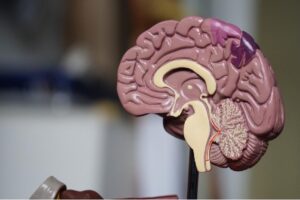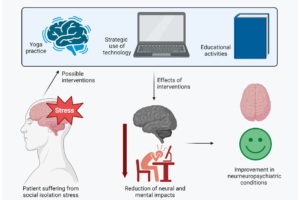
Figure: Blood samples ready to be tested. Addison’s disease is diagnosed by analysis of ACTH levels via a blood test. (Source: Unsplash, Testalize.me)
In 1855 Thomas Addison described symptoms for an illness now known as Addison’s disease, a chronic condition caused by damage to the adrenal glands (Yamamoto, 2018). Addison’s is an incredibly rare disease affecting approximately 100-140 people per million in developed countries (NIH, 2018).
Symptoms of Addison’s disease include lack of energy and motivation, muscle weakness, low mood, nausea and vomiting, hyperpigmentation, loss of appetite, and unintentional weight loss (NHS, 2018). Misdiagnosis of Addison’s is common, as these symptoms are similar to those of better-known health conditions such as the flu and psychiatric disorders such as depression, anxiety and disordered eating (BMJ, 2019). Ironically, President John F Kennedy’s famous suntan was not caused by the youthful active image he liked to portray but by the hyperpigmentation caused by his Addison’s.
The cause of Addison’s disease is due to damage to the adrenal glands, which sit on top of the kidneys and consist of two layers, the cortex (outer layer) and the medulla (inner layer). The adrenal cortex is responsible for the production and regulation of two steroid hormones: cortisol and aldosterone. These steroid hormones act as chemical messengers in the body and are derived from the precursor chemical cholesterol (Litwack , 2018). Cortisol is responsible for the body’s response to stress and helps to regulate blood pressure, the immune system, heart function and blood glucose levels. Aldosterone is responsible for the regulation of sodium and potassium in the blood. Aldosterone also has an impact on the amount of fluid the kidneys remove as urine and maintains blood pressure and volume. Addison’s disease is caused by an autoimmune response where the immune system identifies the adrenal cortex as foreign, triggering an immune response to start attacking it, disrupting the production of these two hormones (UCLA Health, 2021).
Adrenocorticotrophic hormone (ACTH) is a hormone that stimulates the production of cortisol by the adrenal glands. High levels of ACTH often signal adrenal insufficiency, as the adrenal glands are too damaged to properly respond even to elevated concentrations of the hormone (Mount Sinai , 2019). High ACTH alongside low baseline cortisol, low sodium and high potassium is indicative of Addison’s disease. Through a blood test, the patient’s levels of ACTH can be analysed. Normal ACTH concentration values are 9-52 picograms per millilitre: over 52 picograms per millilitre may be a sign of Addison’s disease (Mount Sinai , 2019).
Addison’s is also extremely difficult to diagnose because symptoms develop slowly, often spanning several months as damage to the adrenal glands happens slowly over time. Unfortunately, if left untreated, the inability to increase cortisol production in response to stress can lead to an adrenal (Addisonian) crisis (Rathburn, 2021). This is a medical emergency caused by low levels of cortisol and the deterioration of the adrenal gland. 50% of cases are only diagnosed after an adrenal crisis, cortisol levels are not quickly replenished, this can lead to shock, seizures, a coma or even death. However, if treated quickly, patients can fully recover and live a relatively healthy, active life with consistent treatment (Stoltzfus, 2018).
The ambiguity of Addison’s symptoms is the reason why so few cases are diagnosed before an adrenal crisis occurs. The variety of different symptoms suggest at first more common diseases such as gastrointestinal, primary muscle disease and psychiatric disorders (Papierska & Rabijewski, 2013). Bleiken et al. state that approximately 50% of affected individuals report symptoms of adrenal insufficiency at least six months prior to the correct diagnosis of Addison’s disease (Bleiken, 2010). However, current research and new prevention strategies aim to improve these statistics. The University of Bergen has recently identified genes involved in the development and functioning of the immune system as the main genetic causes of Addison’s. This breakthrough opens up the possibility of personalised treatment to prevent or reverse adrenal destruction (The University of Bergen, 2021).
By raising awareness of Addison’s disease and its symptoms, and increasing the accessibility of ACTH testing, we can reduce the number of patients going without essential treatment for lack of a diagnosis (Rathburn, 2021).
References
- Bleiken, B. (2010). Delayed diagnosis of adrenal insufficiency is common: a cross-sectional study in 216 patients . The American Journal of Medical Sciences .
- BMJ. (2019). A challenging diagnosis that eventually results in a life-threatening condition: Addison’s disease and adrenal crisis. BMJ Case Reports .
- Litwack , G. (2018). Human Biochemistry. Academic Press.
- Mount Sinai . (2019, May 5). ACTH blood test . Retrieved from Health Library: https://www.mountsinai.org/health-library/tests/acth-blood-test
- NHS. (2018, June 14). Addison’s Disease . Retrieved from Health A to Z : https://www.nhs.uk/conditions/addisons-disease/
- NIH. (2018, September ). Definition and Facts of Adrenal Insufficiency & Addison’s Disease . Retrieved from National Institute of Diabetes and Digestive and Kidney Diseases (NIDDK): https://www.niddk.nih.gov/health-information/endocrine-diseases/adrenal-insufficiency-addisons-disease/definition-facts
- Papierska, L., & Rabijewski, M. (2013). Delay in Diagnosis of Adrenal Insufficiency is a Frequent Cause of Adrenal Crisis . International Journal of Endocrinology .
- Rathburn, K. (2021). Addisonian Crisis. StatPearls.
- Stoltzfus, S. (2018, August 29). Addisonian Crisus (Actue Adrenal Crisis). Retrieved from Healthline: https://www.healthline.com/health/acute-adrenal-crisis
- The University of Bergen. (2021, February 12). New study identifies the main genetic causes of autoimmune Addison’s disease. Retrieved from EurekAlert: https://www.eurekalert.org/news-releases/878902
- UCLA Health. (2021, July 20). Acute Adrenal Crisis (Addisonian Crisis). Retrieved from UCLA Health : https://www.uclahealth.org/endocrine-center/acute-adrenal-crisis#:~:text=Acute%20adrenal%20crisis%20is%20a%20medical%20emergency%20caused%20by%20a,or%20even%20loss%20of%20consciousness
- Yamamoto, T. (2018). Latent Adrenal Insufficiency: Concept, Clues to Detection, and Diagnosis . Endocrine Practise , 746-755.
Related Posts
Childhood Unpopularity May Increase Risk of Cardiovascular Disease in Adulthood
Figure 1: Childhood experiences are widely considered to affect adult...
Read MoreThe Public Health Crisis of Alzheimer’s Disease in African American and Hispanic Populations
This publication is in proud partnership with Project UNITY’s Catalyst...
Read MoreThe Gut May Be The Door to Effective Depression Treatment
First Author: Jillian Troth1 Co-Authors [Alphabetical Order]: Roxanna Attar2, Caroline...
Read MoreSocial Isolation Changes Brain Development and Impacts Relationships
For more related news, check out the UnknownNow, an organization for neuroscience...
Read MoreStrength in Numbers: How Community Enhances Perceived Support
Figure 1: Bandmates join in a group hug. The powerful...
Read MoreHuman Endogenous Retroviruses Might Unlock a New Field of Neurodegenerative Disease Research
Figure 1: Researchers have found viral genetic materials within the...
Read MoreAmber Stiby






